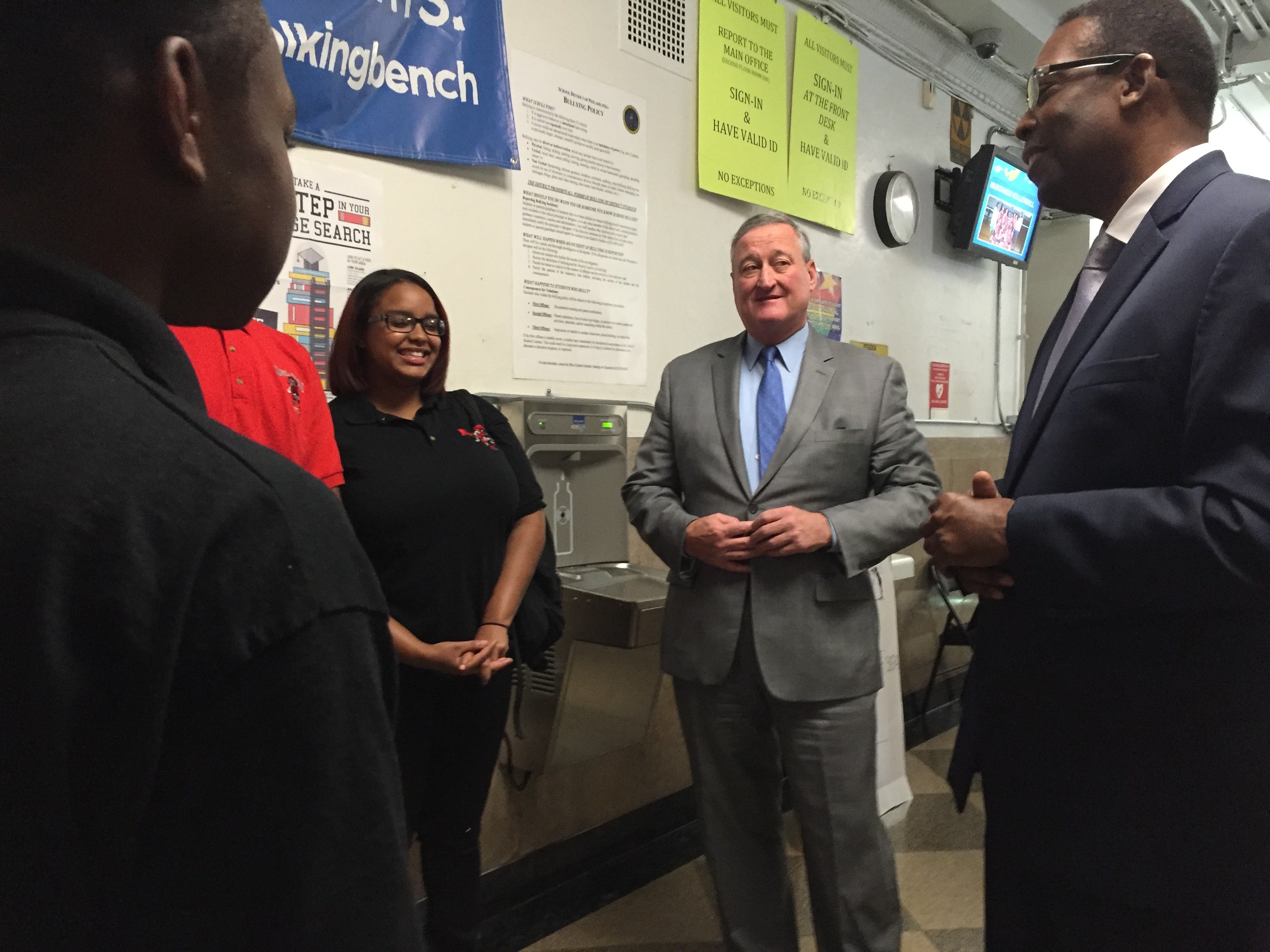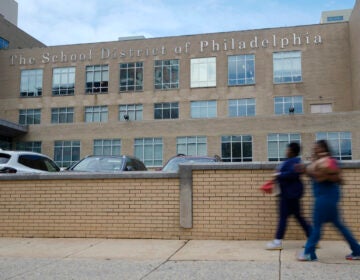Hope abounds as Philly schools begin new year out of crisis mode
Listen
Mayor Jim Kenney and City Council President Darrell Clarke talk to students on first day of school. (Avi Wolfman-Arent/WHYY)
At Paul Robeson High School in West Philadelphia, the first day of school didn’t come with talk of budgets or contracts or politics.
It did come with hugs, free donuts, and a house DJ. As students streamed through the entrance at 42nd and Ludlow Streets and into the thumping auditorium, Principal Richard Gordon IV greeted each like an old friend.
“Ms. Griffin, how are you?,” he said to one 12th-grader. “You ready to start that senior year?”
For the first time in a long time it seems the School District of Philadelphia is indeed ready to start its year. Last fall a budget impasse in Harrisburg cast a pall over opening day. Years prior were overshadowed by fiscal constraints and the specter of austerity.
The 2016-17 school year, however, begins with no immediate crisis — though indeed some long-burning struggles remain.
“I feel great today because it’s the first day and we have an approved budget and we’re making investments in schools and we have additional resources we haven’t had in the past,” said Superintendent William Hite.
Those investments come with the help of a $50 million funding boost from the state. The tangible benefits include 130,000 new books, a nurse and guidance counselor in every school building, and a rejuvenated effort to rehab old buildings.
Murrell Dobbins CTE High School in North Philadelphia received about $50 million in fixes. Those include new windows, such that students can finally see out of them again and enjoy the panoramic views afforded by the school’s sixth-floor cafeteria.
Dobbins is also at the center of the newest experiment in Philadelphia’s reform efforts. Over the summer the mayor’s office named Dobbins one of nine community schools. Mayor Jim Kenney plans to create 25 community schools over five years using money generated from the city’s new tax on sweetened beverages. The schools are supposed to become hubs for community services so that children living in poverty can get the extra help they need to prosper in school.
Kenney, Hite, City Council President Darrell Clarke, SRC member Sylvia Simms, and SRC chair Marjorie Neff all toured Dobbins Wednesday afternoon — tailed, of course, by reporters. While there Kenney snapped a photo of Dobbins’ newest hydration station (they’re not called water fountains anymore), part of the district’s efforts to boost water access across the city. Every school will have a hydration station where students can fill their water bottles by year’s end. Meanwhile, a bill passed by city council now requires city schools to have at least one working water fountain per 100 students.
While at Dobbins, Kenney even delivered some positive news on the labor front, telling the Philadelphia Public School Notebook that his Deputy Mayor for Labor Relations, Richard Lazer, has been meeting with the district and the city’s teachers’ union to resolve a years-long impasse. City teachers have been without a contract for just over three years.
Philadelphia Federation of Teachers president Jerry Jordan led with that point in a Wednesday press release.
“The beginning of a new school year is full of promise, possibility and potential. For the dedicated teachers and school staff that work in Philadelphia’s public schools, that excitement is dampened by the frustration of having gone over 1,100 days without a new PFT contract,” Jordan said.
Quarrels with the PFT aren’t the only problem facing Philadelphia schools. Yet another budget crisis looms in the distance.
Without an infusion of taxpayer dollars district officials say the minor surplus they’re enjoying now will turn into a deficit by fiscal year 2019. The current projections show a fund balance of negative $583 million by fiscal year 2021, driven in part by the rising cost of pension obligations and charter payments.
WHYY is your source for fact-based, in-depth journalism and information. As a nonprofit organization, we rely on financial support from readers like you. Please give today.





